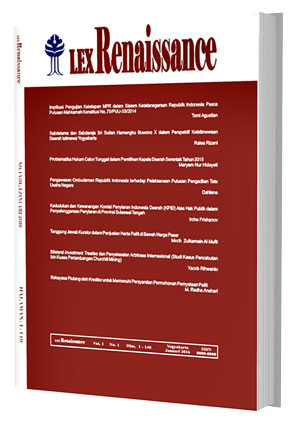Main Article Content
Abstract
Abstract
This study aimed to examine the responsibilities and efforts of Land Titles Registrar (PPAT) to provide legal protection for the parties involved in the process of land use right transfer through buying and selling. PPAT as a general official who makes deeds, especially the deed of land use right transfer, must have specific capabilities related to agrarian matters, considering that the deed can be used as proof of evidence that explains the existence of legal acts of right transfer. This research was a normative juridical study that used the qualitative methods while exploring primary legal materials and secondary legal materials to review the legal issue. The results showed that the responsibility and effort of PPAT to provide legal protection for the parties involved in the transfer of buying-selling were carried out from the beginning of the agreement, during the process of buying-selling agreement, and until the transfer of rights was performed in accordance with the regulations about PPAT. The obligations of the seller are protected if the buying-selling object has been fully paid by the buyer, and the rights of the buyer are protected if the process of right transfer up to the inclusion of the name in the certificate and handover of the certificate containing the name of the buyer has been conducted. To be able to provide legal counseling and to give examples of legal consequences if the parties fail to meet the requirements of right transfer, a PPAT has to master and understand all the applicable stipulations relating to the transfer of rights through buying and selling.
Keywords: Land Titles Registrar (PPAT); land contracts; land use right transfer
Abstrak
Penelitian ini bertujuan untuk mengetahui tentang tanggung jawab dan upaya-upaya PPAT dalam memberikan perlindungan hukum bagi para pihak dalam proses peralihan Hak Atas Tanah melalui jual beli. PPAT sebagai pejabat umum pembuat akta tertentu khususnya akta peralihan hak tanah, harus memiliki kemampuan khusus di bidang pertanahan, mengingat akta tersebut bisa digunakan sebagai alat bukti yang menerangkan telah terjadi perbuatan hukum pengalihan hak. Jenis penelitian ini bersifat yuridis normatif, dengan menggunakan metode kualitatif, sedangkan untuk mengkaji permasalahan hukum, digunakan bahan hukum primer, dan bahan hukum sekunder. Hasil penelitian menyimpulkan, bentuk tanggung jawab dan upaya-upaya PPAT dalam memberikan perlindungan hukum terhadap para pihak, dalam peralihan hak jual beli, dilakukan sejak awal perjanjian, proses perjanjian jual beli, hingga peralihan hak dilaksanakan sesuai dengan peraturan yang terkait ke PPATan. Kewajiban penjual terlindungi jika obyek jual beli telah dibayar lunas oleh pembeli, dan hak pembeli terlindungi jika proses peralihan hak sampai dengan namanya tercantum dalam sertifikat, dan menerima sertifikat yang sudah atas nama pembeli. Agar bisa memberikan penyuluhan hukum, serta contoh akibat hukum jika para pihak tidak memenuhi persyaratan peralihan hak sesuai dengan apa yang dijelaskan PPAT harus menguasai dan memahami semua ketentuan yang berlaku terkait dengan peralihan hak melalui jual beli.
Kata-kata Kunci : PPAT; akta jual beli tanah; peralihan hak atas tanah
Article Details
Authors who publish with this journal agree to the following terms:
a. Authors retain copyright and grant the journal right of first publication with the work simultaneously licensed under a Creative Commons Attribution License that allows others to share the work with an acknowledgement of the work's authorship and initial publication in this journal.
b. Authors are able to enter into separate, additional contractual arrangements for the non-exclusive distribution of the journal's published version of the work (e.g., post it to an institutional repository or publish it in a book), with an acknowledgement of its initial publication in this journal.
c. Authors are permitted and encouraged to post their work online (e.g., in institutional repositories or on their website) prior to and during the submission process, as it can lead to productive exchanges, as well as earlier and greater citation of published work (See The Effect of Open Access).



